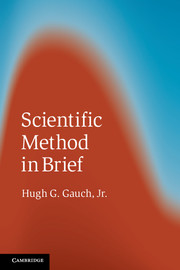Book contents
- Frontmatter
- Contents
- Foreword
- Preface
- 1 Introduction
- 2 Four bold claims
- 3 A brief history of truth
- 4 Science's contested rationality
- 5 Science's presuppositions
- 6 Science's powers and limits
- 7 Deductive logic
- 8 Probability
- 9 Inductive logic and statistics
- 10 Parsimony and efficiency
- 11 Case studies
- 12 Ethics and responsibilities
- 13 Science education
- 14 Conclusions
- References
- Index
7 - Deductive logic
Published online by Cambridge University Press: 05 November 2012
- Frontmatter
- Contents
- Foreword
- Preface
- 1 Introduction
- 2 Four bold claims
- 3 A brief history of truth
- 4 Science's contested rationality
- 5 Science's presuppositions
- 6 Science's powers and limits
- 7 Deductive logic
- 8 Probability
- 9 Inductive logic and statistics
- 10 Parsimony and efficiency
- 11 Case studies
- 12 Ethics and responsibilities
- 13 Science education
- 14 Conclusions
- References
- Index
Summary
The preceding five chapters are directed mainly at this book's purpose of cultivating a humanities-rich perspective on science. This is the first of five chapters directed mainly at this book's other purpose of increasing scientific productivity.
Logic is the science of correct reasoning and proof, distinguishing good reasoning from bad. Logic addresses the relationship between premises and conclusions, including the bearing of evidence on hypotheses.
In the context of logic, an “argument” is not a dispute but rather is a structured set of statements in which some statements, the premises, are offered to support or prove others, the conclusions. Many deductive systems, including arithmetic and geometry, are developed on a foundation of logic in the modern and unified vision of mathematics.
Of course, given the simple premises that “All men are mortal” and “Socrates is a man,” one trusts scientists to reach the valid conclusion that “Socrates is mortal,” even without formal study of logic. But given the more difficult problems that continually arise in science, the rate of logical blunders can increase substantially in the absence of elementary training in logic. Fortunately, most blunders involve a small number of common logical fallacies, so even a little training in logic can produce a remarkable improvement in reasoning skills.
- Type
- Chapter
- Information
- Scientific Method in Brief , pp. 112 - 130Publisher: Cambridge University PressPrint publication year: 2012



